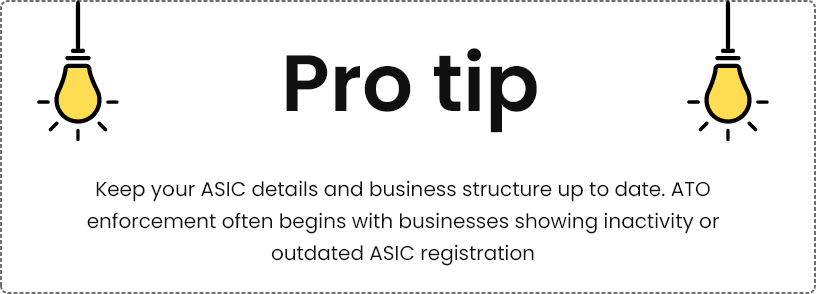5 strategies to manage business tax debt
Introduction:
Tax often gets overlooked while business owners focus on daily operations. It often goes unnoticed until a notice from the ATO arrives, by which time the debt may have grown significantly.
This put unexpected pressure on already tight cash reserves. Unresolved tax debt can result in penalties, interest charges, and enforcement action from the ATO. The longer you wait, the fewer options you have.
Taking a proactive approach gives you more room to manage the situation and prevent it from affecting other areas of your business. In this blog post, we break down five strategies to help you actively manage your business tax debt and avoid further complications.
Key takeaways
The majority of unpaid tax debt in Australia is owed by small businesses. Lack of planning, not poor performance, is often the cause.
Set aside 15–30% of all income into a dedicated tax buffer account to avoid scrambling at tax time.
PAYG should reflect your actual income. Over- or underpaying affects your cash flow and could trigger penalties later.
What is tax debt management?
Tax debt management is the process of staying in control of your ATO obligations through consistent planning, clear cash flow awareness, and timely action. It is not just about lodging on time. It is about building reliable habits that prevent unexpected pressure.
From 1 July 2025, interest on late tax payments is no longer tax deductible. The current rate is 11.17 percent, and it compounds daily. This makes falling behind significantly more expensive. With over 45 billion dollars in unpaid tax owed by small businesses, the risk of letting debt build up is now far greater.
Even a short delay can grow quickly if ignored. Treating tax as a regular monthly expense, much like rent or wages, allows you to manage it with less stress and more consistency throughout the year.
Why are businesses in Australia struggling with tax debt?
Thousands of Australian businesses have collapsed in the past year after falling behind on tax debts. CreditorWatch reports that 33.6 percent of private companies with tax debts over 100,000 dollars became insolvent. Here are a few factors contributing to this situation:
- Many businesses are still recovering from the impact of the COVID-19 pandemic, including delayed tax payments that are now due.
- The ATO has taken a stricter approach to collecting tax, using actions like garnishee orders, director penalty notices, and disclosures to credit reporting bureaus.
- ATO also now uses advanced data tools, including payroll data and banking information, to identify non-compliance in real time.
- Costs such as rent, wages, and utilities have gone up, making it difficult for businesses to stay on top of tax obligations
- Some businesses have been moved from quarterly to monthly GST reporting, which adds pressure on cash flow and increases workload.
- Director Penalty Notices (DPNs) have sharply increased. In the 2024 financial year alone, over 35,000 were issued. DPNs make directors personally liable if required reports are not lodged.
These challenges are causing many businesses to fall behind, even if they are otherwise strong and capable.

5 strategies to manage tax debt
Here’s how to reduce tax-related stress and stay on top of your obligations before they become a burden.
Assess your business's current position
The first step in managing tax debt is to understand the current position of your business. This includes checking how much the business owes in tax, supplier bills, and loans, as well as identifying any payments that are due to come in.
Well-maintained and organised records allow you to track income and spending, manage obligations, and understand how your business is performing. They also make it easier to spot early signs of strain and take timely action.
Using bookkeeping software can make this process much easier. It helps you store and access records quickly, reduces errors, and improves how you manage day-to-day tracking.
Establish a dedicated tax buffer account
One of the simplest yet most effective ways to avoid tax debt is to create a separate bank account solely for tax savings. Aim to set aside 15–30% of all income into this account. By keeping this money out of your primary operating account, you're less likely to dip into it for day-to-day expenses.
This strategy is particularly beneficial because it reframes tax as a fixed cost, just like rent or wages, that must be accounted for every month. When tax time arrives, you will have the funds ready, avoiding the scramble to find money or negotiate payment terms.
Missed a lodgement deadline?
Act quickly on ATO messages
Ignoring letters or calls from the ATO is a serious mistake. The ATO is far more willing to cooperate with businesses that take the initiative to communicate. If your tax debt reaches one hundred thousand dollars and remains unpaid for over ninety days, the ATO may disclose it to credit reporting bureaus, which can significantly damage your business’s credit reputation.
However, the ATO will not report your debt if you are actively engaging with them. This includes having a payment plan in place, lodging an objection or appeal, applying for debt release, or experiencing verified exceptional circumstances such as serious illness or natural disasters.
Before any disclosure, the ATO will send a written notice giving you twenty-eight days to respond. Taking action within this period can help you avoid public reporting and protect your business’s financial integrity.
Review your PAYG Instalments each quarter
PAYG instalments are payments you make throughout the year to cover your expected income tax. These instalments are usually paid every three months and are based on your business or investment income from the previous year.
While the system helps you avoid a large tax bill at the end of the year, it only works well if the amount you are paying matches your current income. If your income has changed, you could be paying too much or too little. Either situation can hurt your cash flow or lead to a surprise tax bill.
That is why it is important to review your PAYG installments each quarter..
Use the ATO’s PAYG instalments calculator to update your estimate and adjust your instalments if needed. For example, if you had a quiet quarter, you may want to lower your payment. If business is growing faster than expected, increasing your instalments can help avoid a large tax payment later.
By reviewing your PAYG instalments every quarter, you stay in control of your cash flow, avoid unnecessary tax pressure, and ensure your payments stay aligned with your current financial position.

Speak to one of our tax accountants
If you are having trouble managing tax debt, speak to one of our tax accountants at CleanSlate. We’ll help you understand where your business stands and explore practical ways to manage what you owe. This may include reviewing current expenses, helping with missed business tax returns lodgements, setting up a payment plan with the ATO, and preparing for upcoming obligations.
We can also suggest ways to manage your tax more effectively in the future by adjusting the timing of payments or planning deductions appropriately. The ATO is more likely to support businesses that take early action, and we’re here to guide you through that process. With our support, you can stay focused on your business while taking the right steps to move forward.
Final thoughts
Managing debt effectively is a complex task that requires a multifaceted approach. By incorporating professional support, businesses can take control of their obligations and avoid unnecessary setbacks that often come from delayed action.
At CleanSlate, we help businesses address tax debt before it grows into a bigger problem. From navigating ATO communication to resolving outstanding lodgements, our team is here to support you with the right steps at the right time.
If your tax debt is starting to feel unmanageable, now is the moment to act. Reach out to CleanSlate today and take the first step toward protecting your business from costly ATO penalties.













